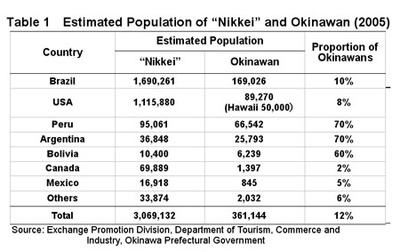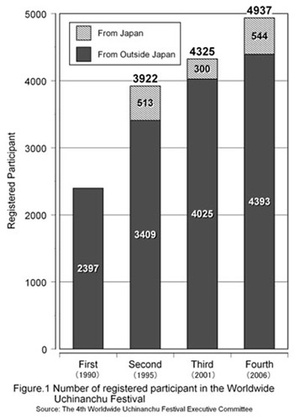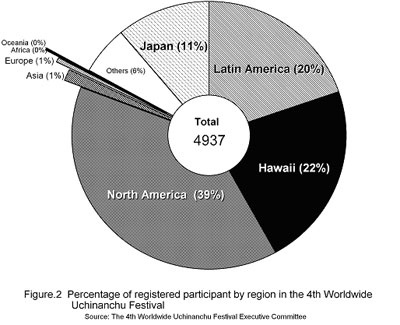Okinawans, also called “Uchinanchu”, have emigrated to mainland Japan and to many other places both before and after World War II, and established communities like the ones in Hawaii and Los Angeles. Emigration was a social phenomenon in the 20th century of Okinawan society and because of this large-scale emigration, presently, many Okinawan descendents live in different places around the world (figure 2). Okinawans have maintained their communities relatively well when compared to other ethnic groups. Their traditions and common values such as cohesiveness and cooperation, have persisted through generations, and they maintain strong community ties under a unique ethnic identity. Today, many Okinawans and their descendents have become good members in their respective countries and societies while maintaining an identity as Uchinanchu.
After about a hundred years since the beginning of their emigration, Okinawans and their descendents are making an effort to establish and even strengthen the bonds among the Okinawan communities around the world seeking out a global identity as “Uchinanchu”. One of the most significant activities of this kind is the Uchinanchu Taikai (Worldwide Uchinanchu Festival) which was first held in 1990. This historical achievement took place under the leadership of the Okinawa prefectural government and was backed by other social demands: nostalgia of the emigrants towards their homeland, the search for their roots by descendants of Okinawan blood, and the desire of the prefecture’s residents to find their pride and hope for the future. It was a unique and big project in which Uchinanchu living in different parts of the world would gather at one place and participate in international exchange.
With the second (1995), third (2001) and fourth (2006) festivals, Uchinanchu strengthened cross-border integration (network) and the number of participants have been increasing (figure 1). The objective of this event is to bring together Okinawans and their descendents from around the world, especially since they are seen as the prefecture’s greatest human resource. The festival also aims to expose young people from overseas to Okinawan history, culture, and the arts to carry on the Uchinanchu identity by broadening and strengthening the human network.
At the 4th Worldwide Uchinanchu Festival, when 4,937 individuals came to the island of Okinawa, a research team from the University of the Ryukyus conducted a survey on participants through a multilingual questionnaire. The purpose of this survey was to see how Uchinanchu connect with each other and develop “Okinawanness” among each other in spite of their cultural and geographical barrier. At the Community Forum on March 1, 2008 at the Japanese American National Museum, the research team will present the findings from the survey and also discuss the impact of this festival on communities in many places around the world and on Okinawa itself, the ancestral land of Uchinanchu.
* * * * *
-- To learn more, Discover Nikkei presents --
Community Forum: Okinawans and Their Global Networks
Saturday, March 1, 2008
2:00 pm - 4:00 pm
In this forum, the results of the overseas Okinawans survey from the Worldwide Uchinanchu Festival will be presented.
Japanese American National Museum in Los Angeles
FREE with Museum admission. Light reception to follow.
RSVP required to 213.625.0414 ext. 2227 or rsvp@janm.org.
click here for more details
This program is organized by the Center for Migration Studies at the University of the Ryukyus and the Japanese American National Museum in collaboration with Lane R. Hirabayashi, Aratani Endowed Chair, Asian American Studies Department at University of California at Los Angeles and the Okinawa Association of America Inc.
* * * * *
© 2008 Hiroyuki Kinjo





